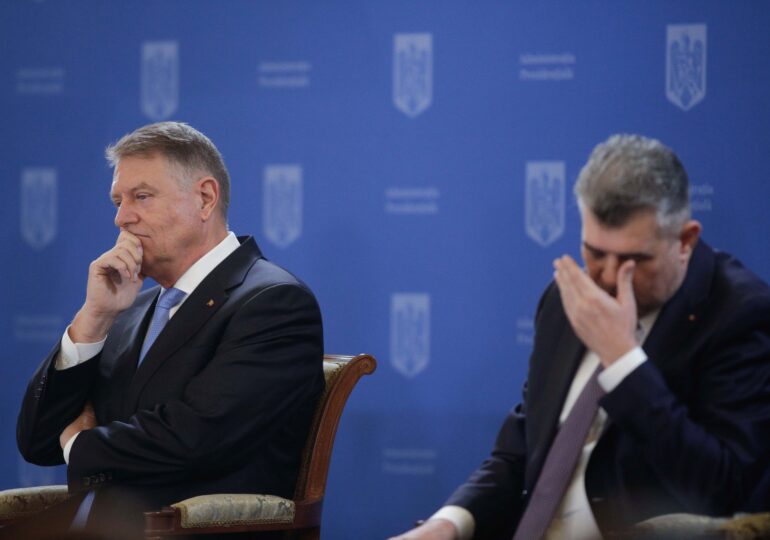PSD spokesperson Lucian Romaşcanu announced on Monday, after the National Permanent Bureau meeting of the PSD, that the party’s decision is not to support the bill that would allow President Klaus Iohannis to run as an independent on the PNL list in the parliamentary elections on December 1.
He emphasized that the PSD’s point of view is that a law cannot be passed for a single person.
”Regarding the vote on the PNL colleagues' law, it was a unanimous vote against voting for such an initiative because, after all, we are in 2024 and laws dedicated to a single person should not exist,” Romaşcanu said.
He specified that PNL did not ask them to support the project, but considering there is a parliamentary initiative, they expected a point of view from the PSD, which was formalized in the NPB meeting.
Romaşcanu also said that the PSD has expressed its political stance, and it is up to the PNL members to decide whether to proceed with it and in what form. ”Politically, we cannot vote on a law for a single person,” added Lucian Romaşcanu.
Subsequently, the PSD president, Marcel Ciolacu, stated that this law is not a priority for him, the government, or the PSD.
The Prime Minister mentioned that there are certain socio-professional categories that cannot run unless they resign, such as magistrates or prefects, but he does not agree with any extension of this law.
”This law is not a priority for me, the Romanian Government, or the PSD. My opinion is that we have evolved as a society in the past 20 years. We have not stood still. There are still certain socio-professional categories that cannot run unless they resign, such as magistrates, prefects.
I do not think it is appropriate, I do not agree with any extension of this law, and I do not agree with any proposal that modifies the substance of the electoral law, as there is a recommendation from the Venice Commission that this should be done a year in advance,” explained the PSD president.
Prior to the PSD meeting, PNL decided not to include in the Monday agenda of the Senate Permanent Bureau the debate on the amendment allowing President Klaus Iohannis to run as an independent on the PNL list in the parliamentary elections on December 1.
The Liberals have referred the matter to the Central Electoral Bureau to pronounce on this amendment, following the opinion expressed by the Legislative Council, and have specified that they will not include the debate in the Senate Permanent Bureau's agenda until they receive a response from the BEC.
The Liberals need a majority to urgently pass the bill through Parliament so that its provisions apply to this year's parliamentary elections.
Therefore, the vote of the PSD members is crucial for the legislative proposal to be voted on in both Houses of Parliament. On Monday, the project was supposed to be discussed in the Senate's legal committee.
What the legislative amendment entails
The leaders of the PNL groups in the Chamber of Deputies and the Senate - Gabriel Andronache and Daniel Fenechiu - have submitted a legislative proposal to amend and supplement art. 52 of Law no. 208/2015 regarding the election of the Senate and the Chamber of Deputies, as well as the organization and functioning of the Permanent Electoral Authority, with subsequent amendments and completions, which has a single article and introduces a new paragraph, with the following content:
”The President of Romania, in office at the time of the election of the Chamber of Deputies, if in the last 3 months of the mandate, can run as an independent on the lists of a political party, a political alliance, or electoral alliances to obtain a mandate as a senator or deputy.
If elected as a senator or deputy, the President of Romania is required, after validation, to choose between the position of senator or deputy and that of president”.
The proposal sets the stage for Klaus Iohannis's candidacy in the parliamentary elections.
The Legislative Council has given its opinion on the PNL proposal with remarks, but appreciates that “the President of Romania has the right to run for the position of senator or deputy on the list of a political party, a political alliance, or electoral alliances, even in the absence of the envisaged norm”.
However, the Economic and Social Council (ESC) has given an unfavorable opinion on the PNL proposal.
“The President's independence, as claimed by the Constitution, is called into question by the association with a political party, even if he remains independent on the lists of this party,” is one of the arguments put forward by the ESC, which also invokes the “need for increased credibility and stability” of electoral legislation.

